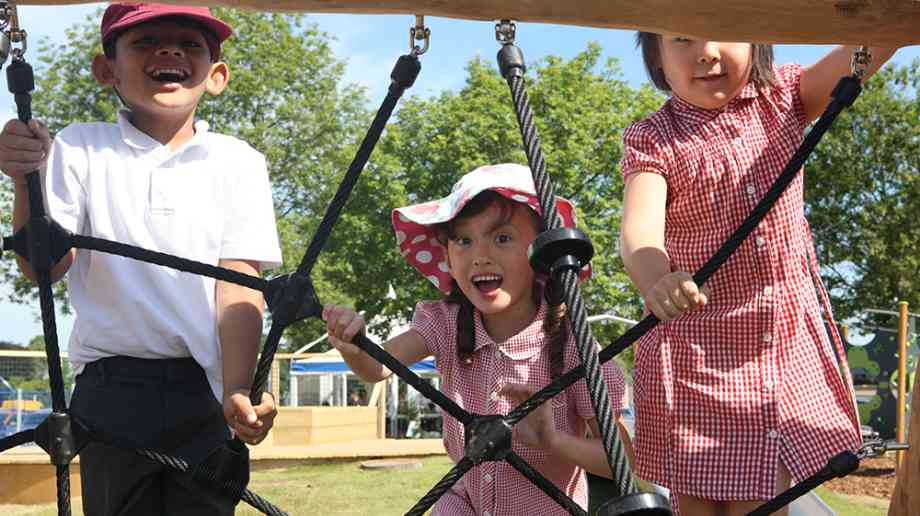
The importance of outdoor play
In today’s technologically-driven world, children’s access to outdoor play opportunities has significantly diminished. Schools, therefore, are playing an increasingly prominent role in ensuring that children have access to outdoor play, writes Mark Hardy, chair of the API
Outdoor play is an essential aspect of childhood development, offering numerous physical, cognitive, and social benefits. Through active play, children develop fundamental motor skills, enhance their coordination, balance and strength. Regular outdoor play also contributes to a healthier lifestyle, helping to combat childhood obesity and other health issues.
Beyond physical benefits, outdoor play stimulates cognitive development. It fosters problem-solving skills, creativity and critical thinking as children navigate and explore their surroundings. Outdoor environments provide opportunities for imaginative play which encourages the development of language, storytelling and social skills.
Outdoor play also promotes social interaction and emotional well-being. It encourages teamwork, cooperation, negotiation and conflict resolution as children engage in group activities and games. Playgrounds provide a space for children to interact with peers, make friends and develop essential social skills necessary for their future interactions.
The role of schools
Schools have a unique responsibility to provide outdoor play opportunities for children. Recognising the importance of play in a child’s development, many schools’ playgrounds and outdoor spaces cater for the diverse needs and interests of their pupils. These play spaces serve as an extension of the traditional learning environment, offering valuable learning experiences beyond the classroom.
School playgrounds are where children learn through exploration, discovery and hands-on experiences. They provide a safe space for children to test their limits, take risks and develop resilience. These experiences build self-confidence and self-esteem, nurturing children’s emotional well-being and promoting mental health.
Furthermore, outdoor play in schools facilitates the integration of various subjects such as science, mathematics and the humanities. This interdisciplinary approach enhances children’s understanding of the world around them and encourages a lifelong love of learning.
The benefits of the school playground
A well-designed school playground, equipped with appropriate outdoor play equipment, offers numerous benefits to children. It provides children with opportunities to engage in physical activities that promote gross motor skills, coordination, balance and strength. Swings, slides, and climbing frames all encourage active play and help children to develop their physical abilities.
Outdoor play also stimulates cognitive development by fostering problem-solving skills, spatial awareness and critical thinking. Play equipment that requires strategic thinking challenges children’s cognitive abilities and promotes mental agility.
What’s more, playgrounds with features like playhouses, sandboxes and natural elements allow children to engage in imaginative play. This type of play encourages creativity, storytelling and role-playing, fostering language development and social interaction.
School playgrounds also help with social interaction, serving as a meeting place for children, enabling them to interact, form friendships and develop important social skills. Play equipment that encourages cooperative play, such as group swings or seesaws, promotes teamwork, sharing and communication.
Outdoor play also has a positive impact on children’s emotional wellbeing. It provides an outlet for self-expression, reduces stress levels and helps children develop resilience and coping mechanisms. Playgrounds offer a space where children can freely express their emotions and experience joy and laughter.
Finally, school playgrounds should be inclusive spaces that accommodate children of all abilities. Inclusive play equipment, such as wheelchair-accessible swings and sensory play panels, ensures that children with disabilities or special needs can participate fully and enjoy the benefits of outdoor play.
Take the roof off children’s learning
Getting children away from the classroom and into the fresh air can bring a host of benefits. Stepping out into your school grounds can open up a world of exciting new learning experiences.
Children of all ages learn through play without even realising, through play, children develop knowledge, skills and lessons for life, from confidence and endurance to communication and leadership. Providing time, space, opportunity and a positive attitude to play benefits children of all ages.
Children have natural energy and enthusiasm so make the most of it by building physical activity into the whole school day. Use your playground and outside spaces to get children moving during lesson time, break and lunch times, before and after school, and for extracurricular activities, as well as during sport and PE lessons. Physical literacy levels improve and schools report improvements in behaviour and wellbeing too.
Indeed, for children in some socially deprived communities, school may provide the only safe outdoor place to play and be physically active. One in eight UK households have no garden, rising to one in five in London.
Government funding to improve school sport and PE provision
The Primary PE and Sport Premium is designed to help schools improve the quality of sport, PE and active play they offer, and to maintain those improvements. Outdoor play equipment promoting physical activity and movement skills is eligible for this funding.
Many schools decide to open their facilities outside of school hours, which helps those communities which lack high-quality facilities for sport and physical activity. Opening your physical facilities to clubs and the local community outside the school day raises the profile of the school within the community while generating an additional income stream.
Choosing your play provider
When it comes to selecting outdoor play equipment for schools, the Association of Play Industries (API) is the UK’s leading trade association for the play industry, committed to ensuring the highest standards of quality, safety and innovation in outdoor play equipment.
API members specialise in designing and supplying play equipment that caters to the specific needs and age groups of children in schools. Their equipment adheres to stringent safety standards, ensuring a secure and enjoyable play experience for children. API members understand the importance of providing fun and challenging play spaces with elements of built-in risk. This drive for innovation ensures API members are always at the forefront of new thinking in play value, inclusivity, safety, diversity, educational value and landscaping.
By choosing an API member to supply outdoor play equipment, schools can rest assured that they are investing in durable, sustainable and high-quality products. API members also provide comprehensive installation and maintenance services, ensuring that the play equipment remains safe and functional throughout its lifespan.
Latest News
15/01/2026 - 10:16
The Scottish Government is increasing investment in its free after school activities programme so that it reaches more children.
15/01/2026 - 09:52
The campaign aims to tackle the worrying decline in reading for pleasure, with reading rates among young people dropping to its lowest level since 2005,
14/01/2026 - 09:58
Almost half (46 per cent) of teachers across Europe do not think schools are equipping students with the skills needed for an AI future — a concern shared by two in five teachers in the UK (41 per cent).
13/01/2026 - 09:51
An additional £20 million of funding has been allocated to support essential capital repairs and maintenance across schools and colleges in Wales this year.
13/01/2026 - 09:45
Now in its 17th year, the Education Business Awards continue to recognise and celebrate the outstanding work, dedication, and achievements of schools and academies across the UK.







